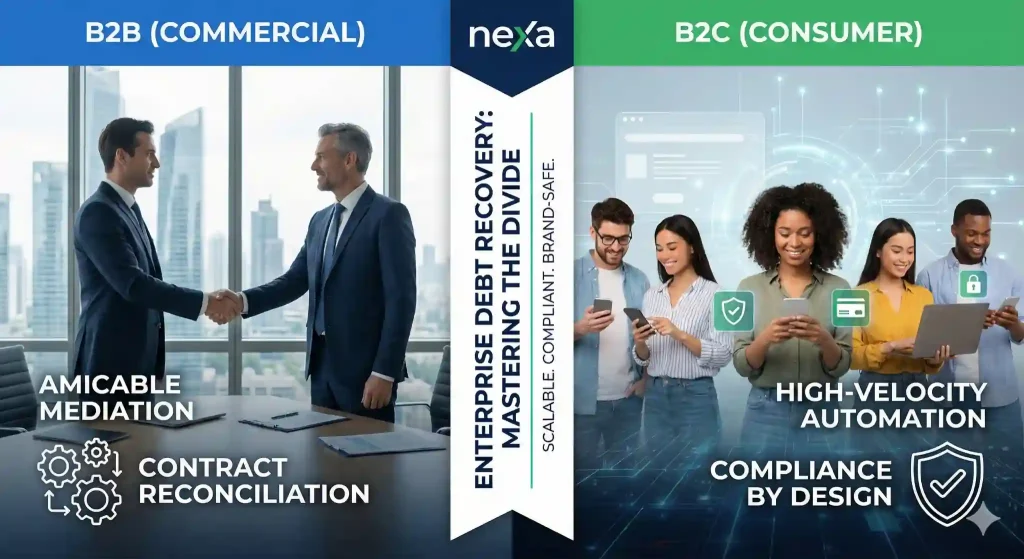Nexa acts as a surgical extension of your A/R department. We understand that while a B2B client requires a “white-glove mediation” to save a million-dollar contract, a B2C portfolio requires an automated, high-velocity system that resolves thousands of small balances without triggering a single regulatory red flag.
Nexa provides 100% reputation-safe, equipped with all 50-state collections license, offering free credit reporting, free litigation, free bankruptcy scrubs, and zero onboarding fees. Secure – SOC 2 Type II & HIPAA compliant. Over 2,000 online reviews rate us 4.85 out of 5.
Need a Collection Agency? Contact us
The Enterprise Reality: Numbers That Matter
| Metric | B2B (Commercial) | B2C (Consumer) |
| Average Invoice Value | $6,420 | $132 |
| Typical Overdue Rate | 10.5% (Global average) | 15% – 22% (Depending on sector) |
| DSO Impact | High (Individual late payments hit cash flow) | High (Volume-based drag on capital) |
| Recovery Lift with AI | 15% – 25% Improvement | Up to 40% Reduction in OPEX |
| Regulatory Focus | Contract Law & UCC | FDCPA, HIPAA, TCPA |
The Nexa Dual-Track Ladder
1. B2B Strategy: Professional Mediation
Commercial debt is rarely about “no money.” It’s usually about a missing PO, a “punch list” dispute, or a slow-moving AP department.
-
The Step 1 Approach: We use Fixed-Fee ($15) white-label notices that act as a neutral third-party “reconciliation request.” This preserves the relationship while signaling that the grace period is over.
-
The Mediation Phase: For aged B2B debt, our mediators act as resolution specialists. We find the person with the “check-cutting authority” and solve the underlying paperwork issue.
2. B2C Strategy: High-Velocity Automation
When dealing with thousands of individual consumers, every manual “touch” by your staff costs you profit.
-
Digital-First Recovery: We use AI-driven omnichannel triggers (SMS, Email, and IVR) to resolve small balances before they hit the 90-day mark.
-
Compliance by Design: Our systems are hard-coded with the latest 2026 consumer protection rules, ensuring that your corporate brand is never associated with “strong-arm” tactics or legal non-compliance.
Enterprise Brand Protection: The “Zero-Complaint” Goal
For a big business, the PR damage from a single mishandled collection can exceed the value of the entire portfolio.
-
The Reputation Shield: We maintain a 4.85 Google rating because we treat people as your customers, not just debtors.
-
Legal Liability Transfer: By moving your recovery to Nexa, you transfer the immense regulatory risk of consumer contact to our fully licensed and insured team.
Recent Enterprise Results
-
National Logistics (B2B Focus): A global carrier had $1.4M in commercial “micro-balances” (under $500) deemed too expensive to chase. Nexa’s Step 1 service recovered $640,000 in 90 days for a total cost of $12,000.
-
Utility/Telecom (B2C Focus): A national service provider reduced their 90-day delinquency bucket by 32% in one quarter using our automated digital triggers, saving an estimated $400k in staff labor costs.
Enterprise FAQ
1. How do you handle B2B accounts that have an ongoing contract?
We use “Amicable Mediation.” We frame the outreach as an “Account Reconciliation” to ensure their service isn’t interrupted. This maintains the revenue stream while securing the past-due funds.
2. Is B2C recovery HIPAA and FDCPA compliant across all states?
Yes. We are 50-state licensed. Our system automatically adjusts outreach based on local state laws (e.g., California’s Rosenthal Act vs. New York’s strict frequency rules).
3. Can Nexa integrate with our ERP (SAP, Oracle, NetSuite)?
Absolutely. We utilize secure API and SFTP integrations to pull delinquency files and push payment updates directly back into your ledger, creating a “Zero-Touch” environment for your finance team. If an integration is not available, then you can upload accounts in batch in an excel file, and upload in our system.
Stop Risking Your Brand. Start Recovering Your Revenue.
Let us show you a more intelligent, effective, and professional approach to your accounts receivable.

